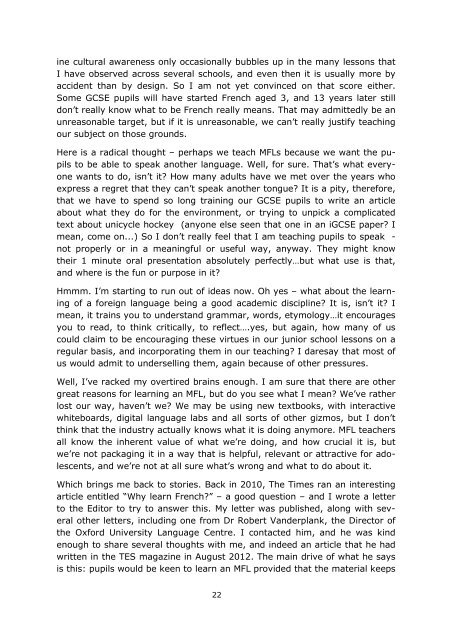Summer 2013 - The Independent Schools' Modern Language ...
Summer 2013 - The Independent Schools' Modern Language ...
Summer 2013 - The Independent Schools' Modern Language ...
You also want an ePaper? Increase the reach of your titles
YUMPU automatically turns print PDFs into web optimized ePapers that Google loves.
ine cultural awareness only occasionally bubbles up in the many lessons that<br />
I have observed across several schools, and even then it is usually more by<br />
accident than by design. So I am not yet convinced on that score either.<br />
Some GCSE pupils will have started French aged 3, and 13 years later still<br />
don’t really know what to be French really means. That may admittedly be an<br />
unreasonable target, but if it is unreasonable, we can’t really justify teaching<br />
our subject on those grounds.<br />
Here is a radical thought – perhaps we teach MFLs because we want the pupils<br />
to be able to speak another language. Well, for sure. That’s what everyone<br />
wants to do, isn’t it? How many adults have we met over the years who<br />
express a regret that they can’t speak another tongue? It is a pity, therefore,<br />
that we have to spend so long training our GCSE pupils to write an article<br />
about what they do for the environment, or trying to unpick a complicated<br />
text about unicycle hockey (anyone else seen that one in an iGCSE paper? I<br />
mean, come on...) So I don’t really feel that I am teaching pupils to speak -<br />
not properly or in a meaningful or useful way, anyway. <strong>The</strong>y might know<br />
their 1 minute oral presentation absolutely perfectly…but what use is that,<br />
and where is the fun or purpose in it?<br />
Hmmm. I’m starting to run out of ideas now. Oh yes – what about the learning<br />
of a foreign language being a good academic discipline? It is, isn’t it? I<br />
mean, it trains you to understand grammar, words, etymology…it encourages<br />
you to read, to think critically, to reflect….yes, but again, how many of us<br />
could claim to be encouraging these virtues in our junior school lessons on a<br />
regular basis, and incorporating them in our teaching? I daresay that most of<br />
us would admit to underselling them, again because of other pressures.<br />
Well, I’ve racked my overtired brains enough. I am sure that there are other<br />
great reasons for learning an MFL, but do you see what I mean? We’ve rather<br />
lost our way, haven’t we? We may be using new textbooks, with interactive<br />
whiteboards, digital language labs and all sorts of other gizmos, but I don’t<br />
think that the industry actually knows what it is doing anymore. MFL teachers<br />
all know the inherent value of what we’re doing, and how crucial it is, but<br />
we’re not packaging it in a way that is helpful, relevant or attractive for adolescents,<br />
and we’re not at all sure what’s wrong and what to do about it.<br />
Which brings me back to stories. Back in 2010, <strong>The</strong> Times ran an interesting<br />
article entitled “Why learn French?” – a good question – and I wrote a letter<br />
to the Editor to try to answer this. My letter was published, along with several<br />
other letters, including one from Dr Robert Vanderplank, the Director of<br />
the Oxford University <strong>Language</strong> Centre. I contacted him, and he was kind<br />
enough to share several thoughts with me, and indeed an article that he had<br />
written in the TES magazine in August 2012. <strong>The</strong> main drive of what he says<br />
is this: pupils would be keen to learn an MFL provided that the material keeps<br />
22



